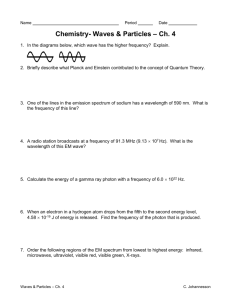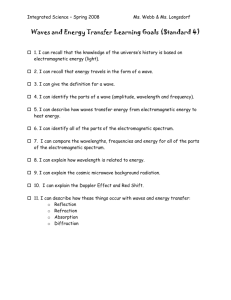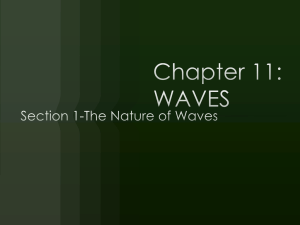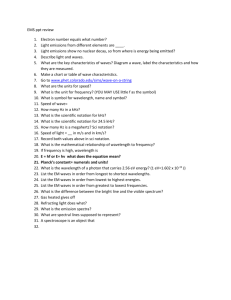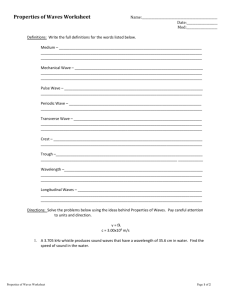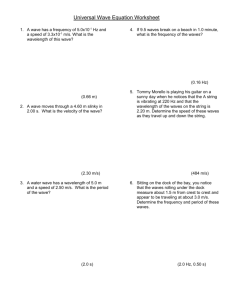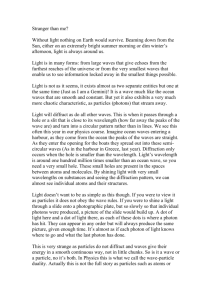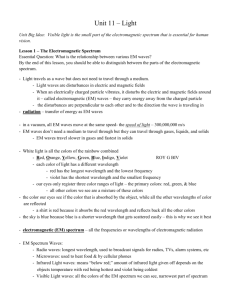Sound and Light Energy Study Guide Answers
advertisement
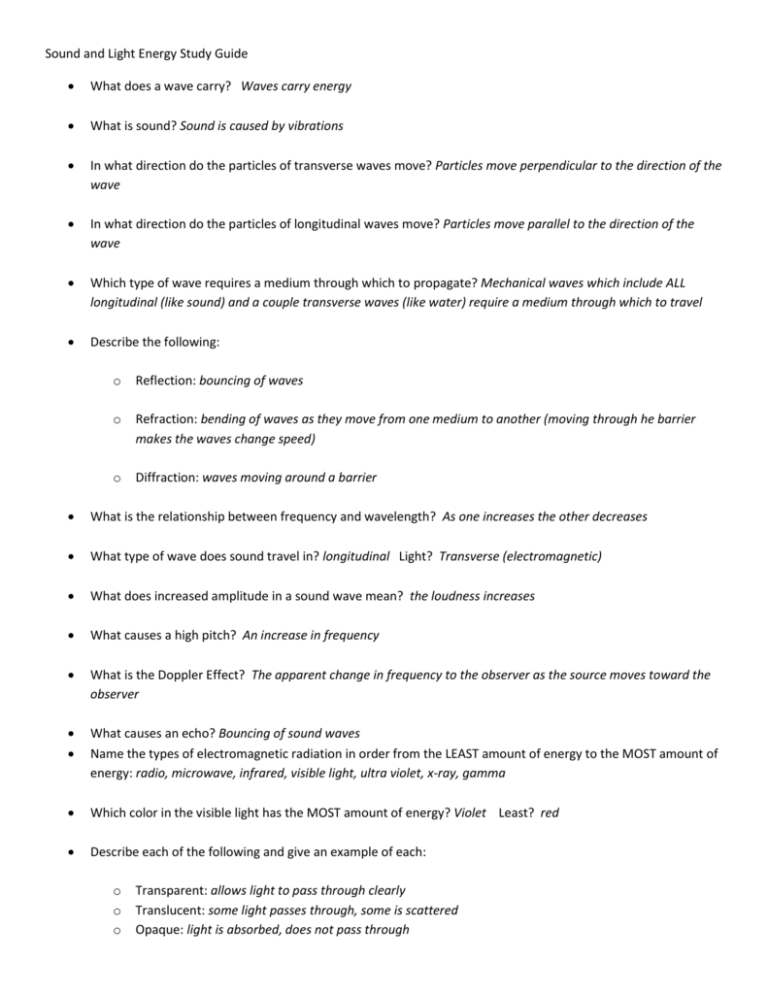
Sound and Light Energy Study Guide What does a wave carry? Waves carry energy What is sound? Sound is caused by vibrations In what direction do the particles of transverse waves move? Particles move perpendicular to the direction of the wave In what direction do the particles of longitudinal waves move? Particles move parallel to the direction of the wave Which type of wave requires a medium through which to propagate? Mechanical waves which include ALL longitudinal (like sound) and a couple transverse waves (like water) require a medium through which to travel Describe the following: o Reflection: bouncing of waves o Refraction: bending of waves as they move from one medium to another (moving through he barrier makes the waves change speed) o Diffraction: waves moving around a barrier What is the relationship between frequency and wavelength? As one increases the other decreases What type of wave does sound travel in? longitudinal Light? Transverse (electromagnetic) What does increased amplitude in a sound wave mean? the loudness increases What causes a high pitch? An increase in frequency What is the Doppler Effect? The apparent change in frequency to the observer as the source moves toward the observer What causes an echo? Bouncing of sound waves Name the types of electromagnetic radiation in order from the LEAST amount of energy to the MOST amount of energy: radio, microwave, infrared, visible light, ultra violet, x-ray, gamma Which color in the visible light has the MOST amount of energy? Violet Least? red Describe each of the following and give an example of each: o o o Transparent: allows light to pass through clearly Translucent: some light passes through, some is scattered Opaque: light is absorbed, does not pass through Describe how we are able to see colors: we see the color of light that is reflected to transmitted, What causes light waves to refract? The changing of the speed of a wave as it passes through one medium into another, this causes it to bend How is white light created? When all colors of LIGHT are combined The different colors of light are caused by the fact that each light has its own wavelength/frequency At _________ degrees, light is reflected. Light is reflected at the same angle as it hits the surface Describe the difference between a concave mirror and a convex mirror and how light is reflected off of each. Concave mirror causes light waves to>>> Convex mirrors cause light waves to>>> Describe the difference between a concave lens and a convex lens and how light passes through. (maybe sketch a picture to help you) Concave lenses cause light wave to spread out (diverge) Convex lenses cause light waves to converge (come together) The human eye is what type of lens? Convex lens Know how to apply the following formulas: 𝑆𝑝𝑒𝑒𝑑 = 𝑤𝑎𝑣𝑒𝑙𝑒𝑛𝑔𝑡ℎ ∙ 𝑓𝑟𝑒𝑞𝑢𝑒𝑛𝑐𝑦 , 𝑆 = 𝜆 ∙ 𝑓 Unit: meters/sec 𝐹𝑟𝑒𝑞𝑢𝑒𝑛𝑐𝑦 = 𝑠𝑝𝑒𝑒𝑑 𝑤𝑎𝑣𝑒𝑙𝑒𝑛𝑔𝑡ℎ 𝑊𝑎𝑣𝑒𝑙𝑒𝑛𝑔𝑡ℎ = , 𝑠 Unit: Hz 𝜆 𝑠𝑝𝑒𝑒𝑑 𝑠 𝑓𝑟𝑒𝑞𝑢𝑒𝑛𝑐𝑦 𝑓 Unit: meters Be able to label all parts of a transverse wave (line of rest, crest, trough, amplitude, wavelength) and longitudinal wave (amplitude, compression, rarefaction, wavelength). wavelength crest trough wavelength Amplitude How compressed the compressions are Compare the speed of sound as it passes through solids, liquids and gases. Sound travels fastest through solids, then next fastest through liquids, slowest through gasses How does temperature affect the speed of sound through air? (Compare warmer air to colder air) Travels faster in warm air and slower in cold air Describe the relationship between thunder and lightning and their speeds. You hear the thunder after the lightning because light travels much faster than sound. Can you hear sound in space? no, because sound requires a medium through which to travel, and there is no medium in space
